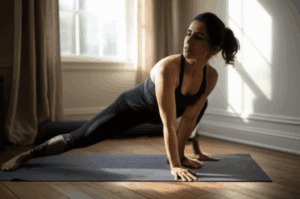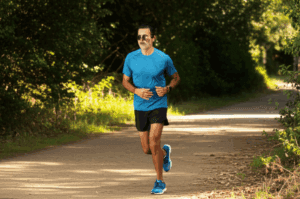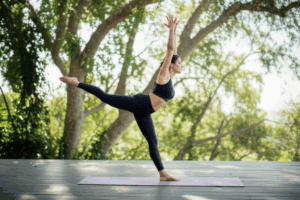The Underestimated Power of Sleep
In the quest for peak physical performance, many focus on rigorous training and meticulous diets, often overlooking a critical component: sleep. The truth is, sleep is not just downtime; it’s a powerhouse for muscle recovery, energy restoration, and overall fitness. A growing body of research highlights the intricate relationship between sleep and exercise, demonstrating that inadequate sleep can significantly undermine even the most dedicated fitness routines.
The Science Behind Sleep and Fitness
Muscle Repair and Growth
During sleep, your body works tirelessly to repair and rebuild muscle tissues. This process is essential for anyone looking to increase muscle mass or recover from intense workouts. Deep sleep stages are particularly important because they trigger the release of growth hormone, a key player in muscle repair and growth. Insufficient sleep disrupts this process, leading to prolonged recovery times and hindering muscle development. Additionally, sleep enhances protein synthesis, which is how the body builds new proteins necessary for muscle repair and growth.
Energy Replenishment
Sleep allows the body to replenish energy stores depleted during physical activity. During deep sleep, the body restores glycogen, the primary energy source for muscles. Adequate glycogen levels ensure optimal muscle function and performance during subsequent workouts. When you are sleep-deprived your muscles are more likely to be fatigued, causing your workout to feel more difficult and making you tire faster.
Hormonal Balance
Sleep plays a vital role in regulating crucial hormones, including growth hormone and cortisol. Growth hormone, essential for muscle repair and growth, is released in higher amounts during deep sleep. On the other hand, cortisol, the stress hormone, can inhibit muscle growth and repair. Getting enough sleep helps maintain a healthy balance of these hormones, optimizing the muscle recovery process. Moreover, testosterone, another hormone crucial for muscle growth and repair, is also primarily released during sleep. Disruptions in sleep patterns can hinder testosterone production, impeding recovery.
Reducing Inflammation
Physical activity, while beneficial, can cause inflammation in the muscles, leading to soreness and discomfort. Adequate sleep helps reduce inflammation by modulating the body’s immune response. During sleep, anti-inflammatory cytokines are released, dampening the inflammatory process and promoting faster recovery.
How Sleep Deprivation Impacts Your Workouts
Reduced Performance
Lack of sleep can negatively impact workout performance by reducing energy, increasing fatigue, and impairing cognitive function. While sleep deprivation might not affect your cardiovascular or respiratory responses to exercise, it can lead to faster fatigue, making it much harder to push through your workouts. Even just one night of poor sleep can decrease endurance performance.
Impaired Cognitive Function
Sleep deprivation reduces your ability to react quickly and think clearly. This can impact your workout by making you less focused and potentially increasing the risk of injury. Poor decision-making and increased risk-taking are also associated with lack of sleep.
Increased Risk of Injury
When you are sleep-deprived, your body’s ability to recover and repair is compromised, increasing the likelihood of injuries. This is particularly true for athletes or those engaged in high-intensity training.
Decreased Motivation
The better rested you are, the better your mind and body function, and this includes at the gym. Adequate sleep is associated with improved motivation to stick to exercise plans. On the flip side, lack of sleep can result in reduced drive, making it harder to stay committed to your fitness goals.
How Much Sleep Do You Need?
General Recommendations
The National Sleep Foundation recommends that adults get 7-9 hours of sleep per night. However, the amount of sleep you need can vary based on factors such as age, activity level, and overall health. Older adults (65+) may need 7-8 hours.
Athletes and Active Individuals
Athletes and individuals who engage in high-intensity workouts may need more sleep, often 8-10 hours. Elite athletes are encouraged to get at least nine hours of sleep nightly, treating it with the same importance as training and diet. If you’re consistently strength training, you may also need to aim for 8-10 hours of sleep.
Listen to Your Body
Ultimately, your sleep needs are individual. Pay attention to your body’s signals. If you consistently feel tired during the day, you may need to increase your sleep duration.
Tips for Better Sleep
Create a Consistent Sleep Schedule
Go to bed and wake up at the same time each day, even on weekends, to regulate your body’s natural sleep-wake cycle (circadian rhythm). A regular schedule helps your body anticipate sleep.
Optimize Your Sleep Environment
Make your bedroom dark, quiet, and cool. Use your bed only for sleep and sex. Reduce clutter and ensure you have a comfortable mattress and pillows.
Avoid Alcohol and Caffeine Before Bed
Both alcohol and caffeine can disrupt your sleep patterns. Avoid these substances in the hours leading up to bedtime.
Limit Screen Time Before Bed
The blue light emitted from electronic devices can interfere with your circadian rhythm. Avoid TVs, cell phones, and computers for a few hours before bedtime.
Develop a Wind-Down Routine
Engage in relaxing activities before bed, such as taking a warm bath, reading a book, or practicing meditation or deep breathing exercises. Mindfulness exercises and breathing techniques such as diaphragmatic breathing or the 4-7-8 method, can help to trigger the relaxation response in the body.
Exercise Regularly, But Not Too Close to Bedtime
Regular exercise is beneficial for sleep, but avoid high-intensity activities close to bedtime, as they can be too stimulating and make it harder to fall asleep. Ideally, finish your workout at least three hours before bedtime. Morning workouts can also help promote better sleep.
Consider Napping Strategically
A short nap during the day can be beneficial if you are sleep-deprived, but try to limit naps to 20-30 minutes to avoid disrupting your nighttime sleep. Napping can be particularly beneficial for athletes who may experience inadequate sleep.
Increase Bright Light Exposure During the Day
Spending time in natural sunlight or bright light during the day helps regulate your circadian rhythm, improving both daytime energy and nighttime sleep quality.
Manage Stress
Stress can significantly impact sleep. Find healthy ways to manage stress, such as yoga, meditation, or spending time in nature.
The Bottom Line
Sleep is not a luxury; it’s a necessity for optimal fitness and overall well-being. By prioritizing sleep and implementing good sleep hygiene practices, you can enhance your workout performance, improve muscle recovery, and achieve your fitness goals more effectively. Don’t underestimate the power of rest – it might just be the missing piece in your fitness puzzle.







